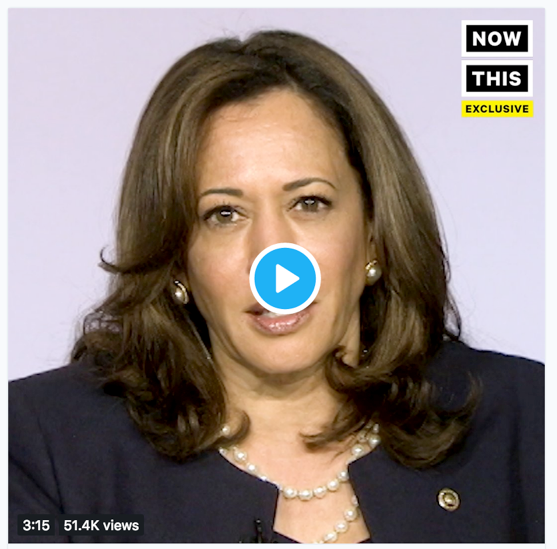Harris
Cosponsors
Landmark
Bill
to
End
Federal
Prohibition
of
Marijuana
Marijuana
Justice
Act
seeks
to
reverse
decades
of
policy
that
has
disproportionately
impacted
communities
of
color,
low-income
communities

Watch
Senator
Harris
on
NowThis
WASHINGTON,
D.C.
– U.S.
Senator
Kamala
Harris
(D-CA)
today
became
the
fourth
U.S.
senator
to
cosponsor
Senator
Cory
Booker’s
(D-NJ) landmark
bill
to
end
the
federal
prohibition
on
marijuana.
The
Marijuana
Justice
Act
would
remove
marijuana
from
the
list
of
controlled
substances,
making
it
legal
at
the
federal
level. Harris
announced
her
support
of
the
bill
in
a
video.
“Right
now
in
this
country
people
are
being
arrested,
being
prosecuted,
and
end
up
spending
time
in
jail
or
prison
all
because
of
their
use
of
a
drug
that
otherwise
should
be
considered
legal,”
Senator
Harris
said.
“Making
marijuana
legal
at
the
federal
level
is
the
smart
thing
to
do,
it’s
the
right
thing
to
do.
I
know
this
as
a
former
prosecutor
and
I
know
it
as
a
senator.”
In
addition
to
removing
marijuana
from
the
list
of
controlled
substances,
the
bill
would
incentivize
states
through
federal
funds
to
change
their
marijuana
laws
if
those
laws
were
shown
to
have
a
disproportionate
effect
on
low-income
individuals
and/or
people
of
color.
The
bill
is
retroactive
and
would
apply
to
those
already
serving
time
behind
bars
for
marijuana-related
offenses,
providing
for
a
judge’s
review
of
marijuana
sentences.
Specifically,
the
Marijuana
Justice
Act
will:
- Remove
marijuana
from
the
list
of
controlled
substances,
making
it
legal
at
the
federal
level;
- Incentivize
states
through
federal
funds
to
change
their
marijuana
laws
if
marijuana
in
the
state
is
illegal
and
the
state
disproportionately
arrests
or
incarcerates
low-income
individuals
or
people
of
color
for
marijuana-related
offenses;
- Automatically
expunge
federal
marijuana
use
and
possession
crimes;
- Allow
an
individual
currently
serving
time
in
federal
prison
for
marijuana
use
or
possession
crimes
to
petition
a
court
for
a
resentencing;
- Create
a
community
reinvestment
fund
to
reinvest
in
communities
most
impacted
by
the
failed
War
on
Drugs
and
allow
those
funds
to
be
invested
in
the
following
programs:
- Job
training;
- Reentry
services;
- Expenses
related
to
the
expungement
of
convictions;
- Public
libraries;
- Community
centers;
- Programs
and
opportunities
dedicated
to
youth;
and
- Health
education
###
|